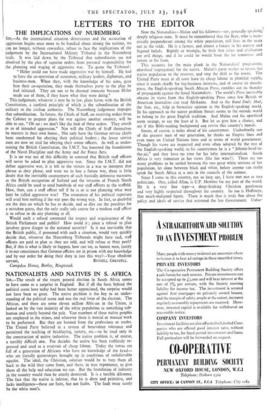LETTERS TO THE EDITOR
THE IMPLICATIONS OF NUREMBERG
SrR,—As the international situation deteriorates and the accusation of aggression begins once more to be bandied about among the nations, we can no longer, without cowardice, refuse to face the implications of the judgement by the International Military Tribunal in the Nuremberg trials. It was laid down by the Tribunal that subordinates are not absolved by the plea of superior orders from personal responsibility for the planning and waging of aggressive war. To quote the Tribunal: " Hitler could not have made aggressive war by himself. He had to have the co-operation of statesmen, military leaders, diplomats, and business-men. When they, with the knowledge of his aims, gave him their co-operation, they made themselves party to the plan he had initiated. They are not to be deemed innocent because Hitler made use of them, if they knew what they were doing."
This judgement, whatever it may be in law, plays havoc with the British Constitution, a cardinal principle of which is the subordination of the military to the civilian authority. The Nuremberg judgement impugns that subordination. In future, the Chiefs of Staff, on receiving orders from the Cabinet to prepare plans for war against another country, will be able to say, " Oh no ; we don't like the look of these orders. - They smack to us of intended aggression." Nor will the Chiefs of Staff themselves be masters in their own house.. Not only have the German service chiefs been condemned for obeying their political leaders ; the lesser service men are now on trial for obeying their senior officers. As well as under- mining the British Constitution, the I.M.T. has loosened the foundations of the Naval Discipline and the Army and Air Force Acts.
It is no way out of this difficulty to contend that British staff officers will never be asked to plan aggressive war. Since the I.M.T. did not define aggressive war, it is left to the victors in a war to interpret that phrase as they please, and were we to lose a future war, there is little doubt that the inevitable counterparts of such basically defensive measures as the British occupation of Iceland and the invasion of French North Africa could be used to send hundreds of our staff officers to the scaffold. How, then, can a staff officer tell if he is or is not planning what may later be called aggressive war? The assurances of his political superiors will avail him nothing if the war goes the wrong way. In fact, so doubtful are the data on which he has to decide, and so dire are the penalties for a mistaken guess, that the only really safe course for a modern staff officer is to refuse to do any planning at all.
Would such a refusal command the respect and acquiescence of the British Parliament and public? How could it ; since a refusal to plan involves grave danger to the national security? Is it not inevitable that the British public, if presented with such a situation, would very quickly decide that, whatever the Nuremberg Tribunals might have said, staff officers are paid to plan as they are told, and will refuse at their peril? But, if this is what is likely to happen, how can we, as honest men, justify it to our consciences that German officers are in prison with our knowledge and by our order for doing their duty in just this way?—Your obedient


































 Previous page
Previous page